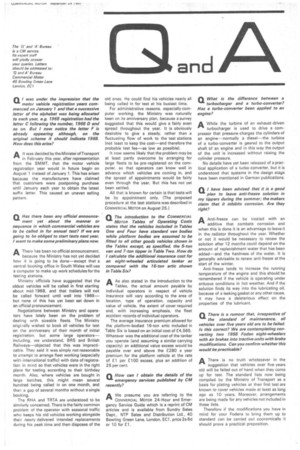G Has there been any official announce' ment yet about the
Page 123

If you've noticed an error in this article please click here to report it so we can fix it.
manner or sequence in which commercial vehicles are to be called in for annual test? If we are going to be obliged to start tests next year. I want to make some preliminary plans now.
AThere has been no official announcement,
because the Ministry has not yet decided how it is going to be done—except that a central booking office in South Wales will use a computer to make up work schedules for the testing stations.
Ministry officials have suggested that the oldest vehicles will be called in first starting about mid-1968, and that trailers will not be called forward until well into 1969— but none of this has yet been set down in an official pronouncement.
Negotiations between Ministry and operators have lately been on the problem of dealing with sizeable fleets. The Ministry orighally wished to book all vehicles for test on the anniversary of their month of initial registration, but some large operators including, we understand, BRS and British Railways—objected that this was impracticable. They said it was simply not reasonable to attempt to arrange fleet working (especially with international traffic) with date of registration in mind so that vehicles were in the right place for testing according to their birthday month. Also, where vehicles are bought in large batches, this might mean several hundred being called in on one month, and then a gap of several months without a single booking.
The RI-IA and TRTA are understood to be similarly concerned. There is the fairly common problem of the operator with seasonal traffic who keeps his old vehicles working alongside their newly delivered intended replacements during his peak time and then disposes of the old ones. He could find his vehicles nearly all being called in for test at his busiest time.
For administrative reasons, especially computer working, the Ministry was naturally keen on its anniversary plan, because a survey suggested that this would give a fairly even spread throughout the year. It is obviously desirable to give a steady, rather than a fluctuating flow of work to the test stations (not least to keep the cost—and therefore the probable test fee—as low as possible).
It now seems likely that the problem may be at least partly overcome by arranging for large fleets to be pre-registered on the computer, so that operators can know well in advance which vehicles are coming in, and the spread of appointments would be fairly even through the year. But this has not yet been settled.
All that is known for certain is that tests will be by appointment only. (The proposed procedure at the test stations was described in COMMERCIAL MOTOR on August 25.)




































































































































































